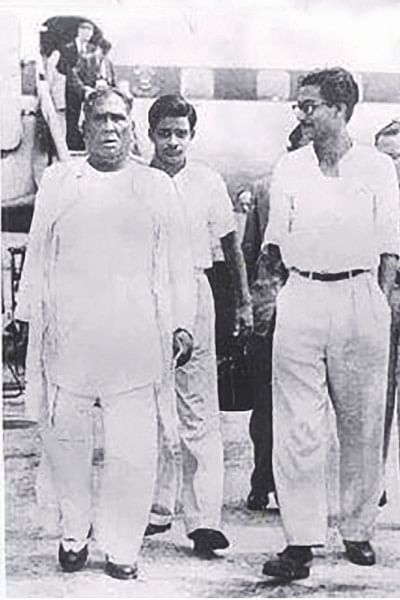Don’t attack Huq Saheb

(1943)
I remember one particular day when my father and I discussed politics till two o'clock in the morning. My father was very impressed with my views. The only advice he had for me was that I should desist from attacking Mr Fazlul Huq personally. This was also what my mother told me another day.
And the fact was Mr Huq hadn't earned the title of 'Tiger of Bengal' for nothing. The people of Bengal had indeed fallen in love with him. Whenever I attempted to say anything to slight him I would be stopped. I remember one day when I was in a meeting that I had organized in our own union. I had raised questions such as: Why had he left the League? Why was he now against the idea of Pakistan? Why had he joined hands with Shyama Prasad Mookerjee to form a cabinet? At one point an old man, someone who held my grandfather in great esteem, who visited our house regularly and had great respect for everyone in our family, stood up and said, 'Say whatever you like. But please don't say anything against Mr Huq. If he doesn't want Pakistan, neither do we! Who is this Jinnah? We know nothing about him! On the other hand, Mr Huq has always cared for poor people like us.'
After his speech I changed my tactics. I decided that I wouldn't blame Mr Huq directly. Instead, I concentrated on explaining to everyone why it was important for us to fight for Pakistan. I should add that whenever we raised a black flag to show our dissatisfaction with Mr Huq, the public would assault us. At times we even had to run away from them or else were beaten up. After we had been beaten up a number of times I decided to change the content of our speeches. Previously I had made the mistake of targeting the man himself when I spoke. The result had always been disastrous for us. Instead of helping our cause such an approach harmed it. When I began to understand that I was hurting the feelings of ordinary people I decided I would have to concentrate on explaining the causes behind our movement for Pakistan. There would be two Pakistans, as envisaged in the Lahore Resolution. One would comprise Bengal and Assam and would be called East Pakistan. It would be an independent and sovereign nation.
The other Pakistan would consist of the Punjab, Baluchistan, the Frontier Province and Sind. This would be called West Pakistan and it too would be an independent and sovereign nation. As for Hindustan it would consist of the Hindu-majority areas of India but Muslims would have equal rights there too. I always carried a map of India with me. I would also have Mr Habibullah Bahar's Pakistan and Mujibur Rahman Khan's massive book of the same name with me. I knew both books almost by heart. I would also have cuttings from the daily Azad in my bag whenever I travelled.
Source: Bangabandhu Sheikh Mujibur Rahman's The Unfinished Memoirs, published by University Press Limited

 For all latest news, follow The Daily Star's Google News channel.
For all latest news, follow The Daily Star's Google News channel. 



Comments